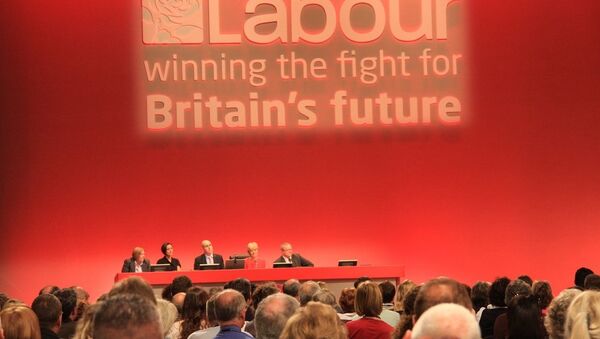Corbyn — who has long been an anti-war campaigner — has made it clear he disagrees with extending airstrikes against Daesh, also known as ISIL, to Syria. Britain is already taking part in similar military action in Iraq and UK Prime Minister David Cameron is pushing for extending that action into Syria.
This morning I was on #Marr Show, discussing my position on Britain extending bombing from Iraq to Syria. https://t.co/CM17bTaATa
— Jeremy Corbyn MP (@jeremycorbyn) November 29, 2015
Corbyn is a member of the Socialist Campaign Group, the Palestinian Solidarity Campaign, Amnesty International, the Campaign for Nuclear Disarmament and was chair of the Stop the War Coalition, until he was forced to step down in September.
Corbyn spent the last weekend calling on grassroots Labour members to put pressure on their lawmakers to vote against bombing, while at the same time Conservative Defense Secretary Michael Fallon and Foreign Secretary Philip Hammond were phoning Labour lawmakers to persuade them to back the airstrikes.
To Hilary Benn and all Labour MPs playing with fire by voting for pointless UK war https://t.co/usF52d9eR0 pic.twitter.com/gPmAiEQtvi
— Stop the War (@STWuk) December 1, 2015
Corbyn's stance on bombing is not shared by his own shadow Defense Secretary Hilary Benn who said the case for airstrikes was "compelling" and that there was a clear threat to British security.
"I am in favor of taking action that is effective in ending that threat," Hilary Benn told the BBC.
The Labour party leader was forced to back down on imposing a three line whip on his lawmakers — which would have demanded they vote with Corbyn against the bombing — in the face of opposition from at least half of his shadow cabinet and many of his lawmakers. Instead, his MPs will be free to vote whichever way they choose.
It is now expected that up to 100 of his own party are expected to defy Corbyn and vote with Cameron's government in favor of airstrikes. The vote — on Wednesday — is now set to go ahead with Corbyn speaking in the debate against bombing, while his own defense spokesman will be sitting with him on the front bench of parliament speaking in favor of bombing.
Lack of Leadership
The fact that Corbyn has not been able to establish his authority over his party is a further sign of his weakness as a leader. He was elected by a majority of Labour party members, but does not share the backing of most of his lawmakers in parliament.
His election was controversial in that he entered the leadership race late and was never a front runner to begin with. However, to the surprise of many, he managed to win — helped by a rule change that allowed people to join the party for as little as US$4 as well as enabling them to vote.
The fact that Corbyn has backed down over the Syria vote in the face of clear opposition within his own party throws his leadership into further disarray.
He was not helped by a new YouGov opinion poll released Monday that showed that — of the nine million people who voted Labour in May — around four million disagree with Corbyn and his shadow chancellor John McDonnell on the economy.
Peter Kellner: four million Labour voters lack trust in Corbyn and McDonnell on the economy https://t.co/5NfJa8m9mC pic.twitter.com/WtqmJ3Posc
— YouGov (@YouGov) November 30, 2015
Asked who they trust more to improve the economy, 40 percent of voters say the Conservatives, and only 23 percent say Labour. This 17-point lead is the Government's greatest since Labour lost power more than five years ago.



